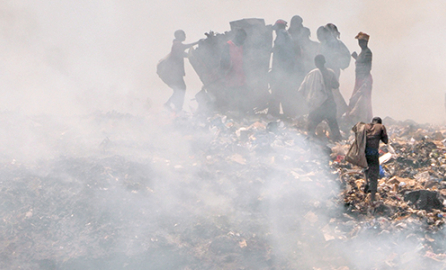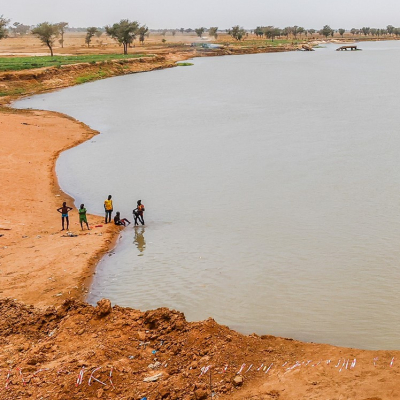Around 20 years ago, all Chile’s waste was dumped illegally. Today, about two-thirds of capital Santiago’s waste is processed at a plant outside the city, which recovers gas from the waste to generate electricity. It produces more than 22 MW now, which is expected to grow soon to 30 MW.
“We’re taking a pollutant that has negative impacts on health, negative impacts on climate – both at the local right up to the global scale – and turning it into something that’s beneficial for the community in terms of clean-produced electricity,” said Dan McDougall, Senior Fellow at the Climate and Clean Air Coalition. “We’re trying to take those types of examples, and work with others to scale them up all around the world.”
More such projects are needed to deal with cities’ growing piles of waste. Rapid urbanisation is producing ever-larger volumes of rubbish, with a variety of negative impacts on both residents and the global environment. Unmanaged waste often ends up in the streets or water drains, attracting pests and vermin. Unsanitary landfills can pollute underground water with toxic leachate. And the decomposition of organic materials produces methane, an even more powerful greenhouse gas than carbon dioxide. If rubbish is disposed of through open burning, however, it gives off black carbon, or soot, which can cause respiratory problems and cardio-vascular disease.
Approached creatively though, the separation, collection and recycling of waste can be a source of income, as shown by the Chilean example. This first needs political will, and politicians need to know the possibilities before they get behind them. Even then, ideas can run into financing difficulties, which are often best solved by persuading outside investors that there’s a business return from waste.
“Retrofitting a proper waste management system in built-up areas is a challenge,” said Alice Kaudia, Environment Secretary in Kenya’s Ministry of Environment and Natural Resources. “Investors want to know what volumes of waste we are generating, to justify the setting up of an industry that can help us transition from open dumping to use of waste as a valuable input on an industrial scale.”
Kenya illustrates the challenges faced by many African cities. New urban centres are emerging, and the growing economy means people buy more – and throw more away. Nairobi, where five million of Kenya’s 45 million population live, generates some 3,000 tons of waste every day. But the municipality collects only around half of this, and the balance is scattered in informal areas or illegal dumping sites. “Rising incomes and a high-end consumption preference, as well as our fast urbanisation across the country, is worsening our situation with respect to waste management,” said Kaudia.
Kenya’s constitution was changed in 2010, granting every person “the right to a clean and healthy environment”. Legislation has followed, including a ban on plastic bags to come into effect in August 2017. A waste management bill was scheduled to be ready by July 2017 , and will promote the enforcement and compliance of waste management. One problem is that some of the people who run illegal dump sites are “protective of their investments”, Kaudia said: “So when you want to change and formalize the system it becomes a challenge.” The challenge is to foster investor confidence in the waste sector, so that investors see opportunities in cleaning up the huge rubbish dumps in Nairobi and other major cities. “We have taken the policy and regulatory effort supported by political will to ensure that waste management is taken up as a priority by all – industry and citizens,” she said. “We are in a state of preparedness policy-wise by law. Only finance is lacking.”
Public money and development finance help, but there isn’t enough to implement all the projects needed around the world. Alternatives are to blend development finance and private funding. Twelve cities in C40 – a network of the world’s megacities committed to addressing climate change – have now issued green bonds, starting with Johannesburg. “Some of the leading cities taking this work forward are in developing countries,” said James Alexander, C40’s Programme Director for City Finance. “They have shared that learning with other cities all around the world.” Another way is to find solutions that work for the private sector, he said: “Part of that means demonstrating the scale of opportunity around the world for the private sector to become involved.”
Wherever the finance comes from, it will be money well spent for the cities, said McDougall. “We always think of these initiatives as being very costly, and indeed there are upfront costs,” he said. “But when you factor in the environment and human health, the benefits even from just those aspects always significantly outweigh the costs. If we can then actually have economic returns to private investors and local or national governments, then the benefits of doing this become even clearer.”


Log in with your EU Login account to post or comment on the platform.